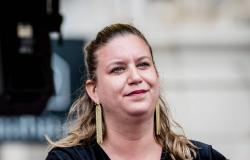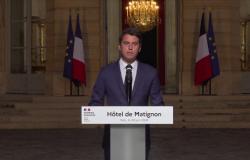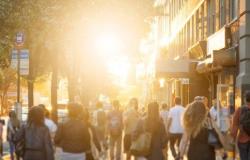The Women for Sea association carries the voice of women committed to protecting the sea. In June it organizes the Odyssey of the Drop of Water, combining sporting events and educational workshops to raise awareness of the interconnections between ecosystems. The full list of signatories to the forum is at the end of the text.
By the time you finish reading this sentence, 50 % of the oxygen that you will have breathed will have been supplied to you by the sea. Indeed, if you are here today as a living being on Earth, it is because the sea – thanks to its phytoplankton – has allowed this oxygen to be released, thus making life possible on our planet.
But your connection to the sea goes far beyond the fact that every second breath comes from it. The sea being connected to the mountains by the hollows of the rivers, wherever you are – in the city, on the coast, in the countryside or in the mountains – you take your place in the great cycle of water and are intrinsically linked·and to her.
The air we breathe, the water we drink, the food we consume: a large part of our basic needs directly depends on good health. Even atmospheric conditions suitable for human life are enabled by the sea, which regulates the earth’s climate — by absorbing 25 % of CO2 and 90 % of the heat generated in the atmosphere, and by redistributing the thermal energy absorbed thanks to the currents circulating around the planet.
We participate in its deterioration
In return, our way of inhabiting the Earth, whether in the mountains, near rivers, in the city, on the coast, has consequences on the entire water cycle, and consequently on the sea.
Global warming, overfishing, pollution, etc., are disrupting its balance and having consequences on the incredible marine biodiversity it shelters. Today, according to the report of theIPBES (the intergovernmental scientific and political platform on biodiversity and ecosystem services, aka the IPCC for biodiversity), only 3 % of ocean areas would not have been impacted by human activities.
We must adjust our lifestyles to preserve the sea and the oceans.
Pexels/CC/Francesco Ungaro
The consequences are abysmal: the warming of water breaks records every year, the oxygen content decreases, the acidification of water intensifies… Overall consequences of these modifications: 75 % of mangroves, 30 % of herbaria and 50 % of corals have disappeared in fifty years, even though these ecosystems, which shelter the majority of marine life, are key elements for carbon sequestration and oxygen production.
How can we explain this dichotomy between this vital link to the sea and our active participation in its deterioration? ? And above all, how to solve it collectively, in order to protect the sea as much as it allows us to live ?
Sensory disconnection
This crumbling link between us and the sea is a reflection of what is happening with all living things. Our lifestyles (material overconsumption, permanent technological innovation, sedentary lifestyle, urbanization, virtualization of activities, etc.) reduce the time and quality of our interactions with the world around us and make us lose sight of the interconnection between all its components.
This sensory, emotional and intellectual disconnection alters all of our behaviors and attitudes towards living things, and ultimately its preservation. The protection of the sea therefore begins with a (re)discovery of what binds us to it on all sides.
“ Let’s immerse ourselves in the sea, listen to the murmur of the rivers »
So let’s open our senses and reconnect with water and earth. Let’s immerse ourselves in the sea, listen to the murmur of the rivers, blend into the immensity of the mountains, observe the other creatures with which we share space. Let us marvel at the beauty and complexity of the world, allowing ourselves to be overwhelmed by its fragility, while admiring its resilience.
Let us promote the dissemination of knowledge about the living world and share it with as many people as possible, taking into account the interdependence of ecosystems and our place within them, for a more global, ecosystem-based and accessible understanding.
It is by reconnecting sensorially and intellectually with the sea, by understanding it (etymologically, “ cum »with, and “ prehendere »take, grab ; therefore take with us, embrace), that we can become aware of our responsibility towards it, and thus adjust our lifestyles to preserve it.
Commit to the sea
Let’s work together, at all scales, to protect the sea, wherever we are. “ Never doubt that a small group of people can change the world. In fact, this is how the world has always changed »recalled the anthropologist Margaret Mead.
Individually, we can bring awareness back into all our daily choices. For example, we can adapt our mode of consumption of food, clothing, goods of all kinds by choosing products with a reduced impact on our environment… We can also reduce our carbon footprint by choosing carbon-free means of transport (the bicycle, train, sailing, etc.) and by consuming products of local origin.
We can also act effectively at local, national and regional levels thanks to our voting power. We can elect representatives·es whose programs and beliefs truly consider the issues of biodiversity and climate. Each·e of us can also get involved locally within our authorities and local authorities to participate in the governance of our environment.
And then, on the occasion of this World Oceans Day organized by theUNwe invite you to join forces with those of associations orNGO of general interest. To raise our voices higher and stronger, and to evolve all the links in the chain that constitute our society, in order to give the sea all the attention and care it deserves.
All the signatories of the platform:
– Marianne Bréchuco-president of the Water Family
– Anaelle Marot, Solène Chevreuil, Philomène Le Layfrom Projet Azur
– Charlene Descollongeshydrologist and co-founder of the association Pour une hydrologie regenerative
– Lamya Essemlalidirector of Sea Shepherd France
– Victoria Guillonfrom the Nouvel Œil podcast
– Fiona Millepresident of Mountain Wilderness France
– Anne-France Didierresponsible SDG14 at the General Directorate of Maritime Affairs, Fisheries and Aquaculture (DGAMPA) and partner of the Génération Mer collective
– Anne Lassman-Trappierair pollution expert, president of France Nature Environnement Savoie
– Tanya Navilledirector of the association, and Katarina Zouechtiaghdevelopment manager for Women in the Mountains
– Souba Brunelco-founder of Les Impactrices
– Marie-Kell De Cannartfrom the Look Down collective
– Leslie Bisseyfounder of We Ocean Project
– Solène Basthard-Bogaindeputy director of Septentrion Environnement
– Marie-Dominique Champloydirector of Marseille, capital of the sea
– Anne-Sophie Mouraud, by Coexistence Crew
– Stan Thuretprofessional skipper and member of the La Vague collective
– Morgan Bourchisworld freediving champion
– Luc Thibalnational technical director of the French Federation of Alpine and Mountain Clubs (FFCAM)
– Catherine Jolibertdirector of L’Ice Climbing Écrins
– Matthew Carlhianpresident of the Bureau des Guides des Écrins
– Swann Bommierfrom the Bloom association






